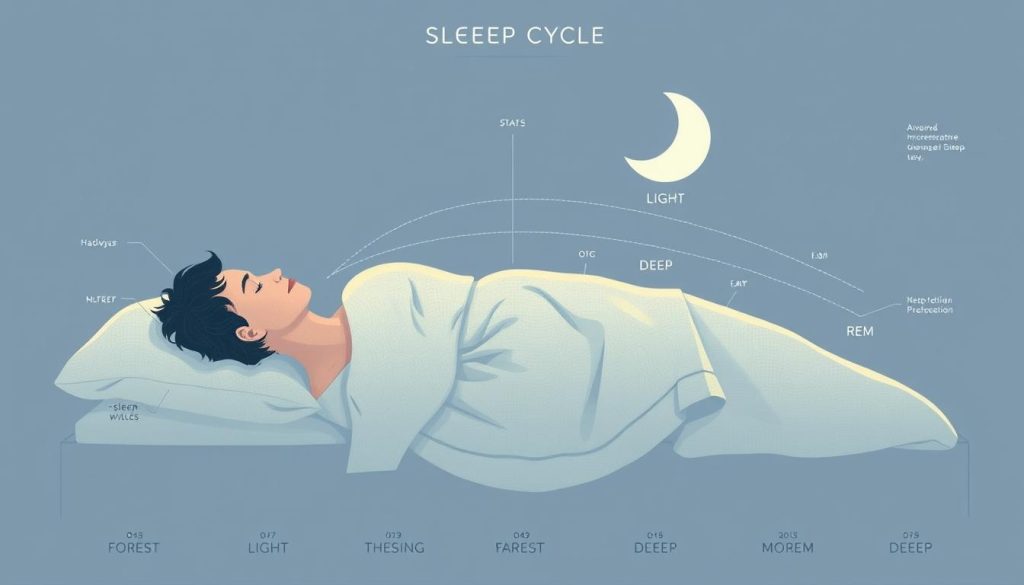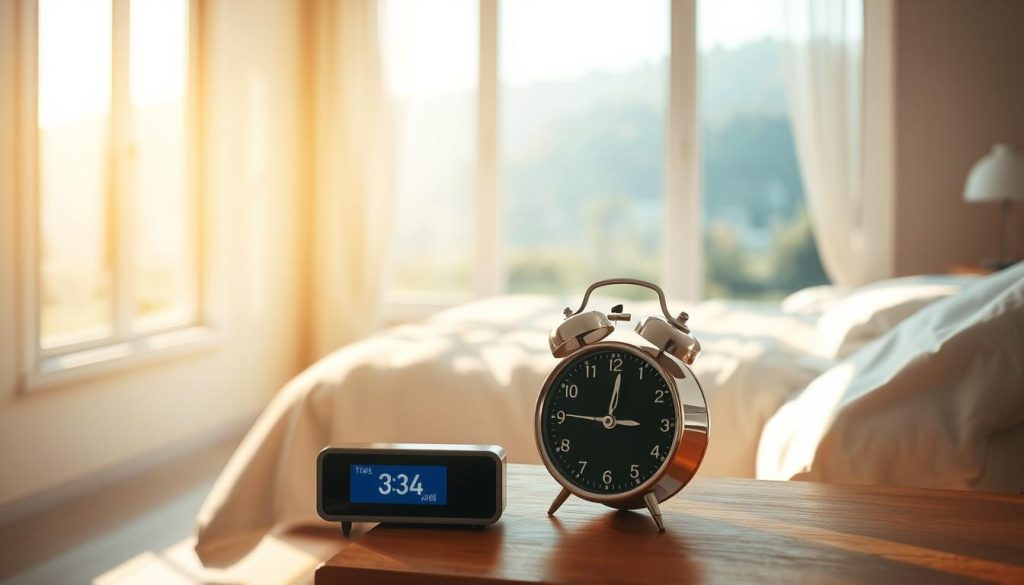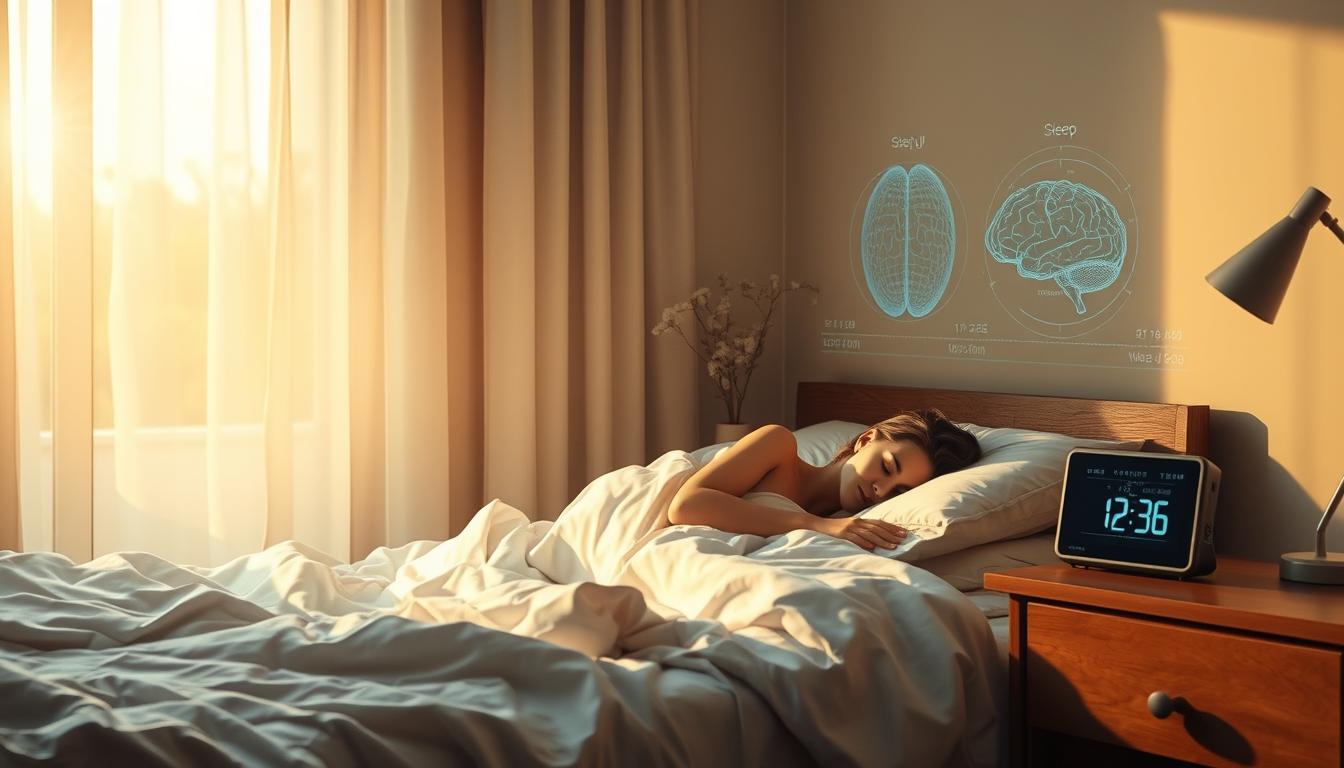Do you wake up feeling tired, even after sleeping eight hours? The answer might be in finding your body’s natural wake-up time. Discovering when you should wake up can boost your energy and health.
Our internal clocks work differently for everyone. Some people wake up ready to go at 6 AM, while others prefer 9 AM. Your genes and lifestyle play a big role in your sleep patterns.
Our modern lives often mess with our natural rhythms. Things like artificial light, irregular schedules, and screens can upset our internal clocks. This can make us sleep poorly and feel tired during the day.
Improving your sleep is more than just sleeping for a certain number of hours. It’s about waking up at the right time for your body. When you wake up in sync with your body, you’ll feel more focused, happy, and perform better during the day.
Understanding Your Body Clock: Circadian Rhythms
Every cell in your body has a natural 24-hour rhythm. This rhythm affects your energy levels all day. It’s like a clock inside you that controls when you’re hungry or when your body temperature changes.
This internal clock, or biological clock, is like a conductor. It keeps your body’s functions in sync with the day-night cycle. When it works right, you’re alert during the day and sleepy at night.

What Are Circadian Rhythms?
Circadian rhythms are changes in your body that happen every 24 hours. The term “circadian” means “about a day” in Latin. These rhythms are found in all living things, from plants to humans.
Your main biological clock is in a small part of your brain called the suprachiasmatic nucleus. It has about 20,000 nerve cells that keep time. These cells get signals from your eyes about light and darkness.
These internal rhythms control important functions:
- Sleep-wake cycles and alertness levels
- Body temperature fluctuations
- Hormone production and release
- Metabolism and digestion
- Blood pressure and heart rate
How Do Circadian Rhythms Affect Sleep?
Your circadian rhythm affects when you feel sleepy or alert. As evening comes, your clock starts making you feel tired. This usually starts around 9 PM for most people.
At night, your body temperature goes down and your heart rate slows. These changes help you sleep deeply. In the morning, your clock makes you wake up by reducing melatonin and increasing cortisol.
When your sleep schedule matches your natural rhythm, you sleep better. You fall asleep easily, sleep deeply, wake up naturally, and feel better.
Recognizing Your Personal Body Clock
Not everyone’s circadian rhythm is the same. Some people are early risers, while others prefer staying up late. This is called your chronotype.
To find your natural chronotype, notice these patterns:
- When you naturally feel sleepy without external influences
- What time you wake up on weekends without an alarm
- When you feel most energetic and productive
- How you feel when you have to wake up very early
Most people are somewhere in between being early birds and night owls. Knowing your chronotype helps you wake up at the best time for your body. This leads to better sleep and overall health.
The Science Behind Sleep Cycles
The human sleep process unfolds in remarkable 90-minute cycles. Each cycle has unique stages that serve specific restoration purposes. Your brain doesn’t simply shut down when you sleep. Instead, it follows a complex pattern that repeats throughout the night.
Understanding these natural rhythms can revolutionize your sleep habits. When you align your wake-up time with these cycles, you’ll experience more refreshing mornings and sustained energy levels.
What Happens During Sleep Cycles?
Each sleep cycle progresses through four distinct stages. The first stage is light sleep, where you drift between wakefulness and sleep. Your muscle activity slows down, and you can be easily awakened.
Stage two brings deeper relaxation. Your heart rate and breathing slow down significantly. Your body temperature drops, and brain waves become more rhythmic. This stage typically lasts 10 to 25 minutes.
Deep sleep occurs in stage three. This is when your body performs its most important restoration work. Growth hormone releases, tissues repair, and your immune system strengthens. Waking up during this stage leaves you feeling disoriented and groggy.

The final stage is REM sleep, where most vivid dreams occur. Your brain becomes highly active, almost matching wakefulness levels. This stage plays a crucial role in memory consolidation and emotional processing.
The Importance of REM Sleep
REM sleep deserves special attention in your sleep habits because it directly affects cognitive function. During this stage, your brain processes information from the day and forms long-term memories.
This critical phase typically occurs in longer periods toward morning. That’s why cutting sleep short often eliminates valuable REM time. Your brain uses this stage to solve problems, enhance creativity, and regulate emotions.
Research shows that people who wake up during REM sleep often feel confused and mentally foggy. The brain needs time to transition from this highly active state to full wakefulness. Respecting this natural process leads to clearer thinking and better mood regulation.
REM sleep also supports learning and skill development. Students and professionals who prioritize complete sleep cycles often show improved performance and memory retention.
Aligning Wake Time with Sleep Cycles
Timing your wake-up with sleep cycles can dramatically improve how you feel each morning. Since cycles last approximately 90 minutes, you can calculate optimal wake times by working backward from your desired wake-up hour.
For example, if you want to wake up at 7:00 AM, count back in 90-minute intervals. Ideal bedtimes would be 9:30 PM, 11:00 PM, or 12:30 AM. This ensures you complete full cycles before waking.
Most adults need 7 to 9 hours of sleep, which equals 5 to 6 complete sleep cycles. Quality sleep habits involve consistent timing rather than just focusing on duration. Your body thrives on predictable patterns.
Pay attention to how you feel when waking at different times. Keep a sleep journal to identify patterns. Notice whether you feel more refreshed when you wake up after completing full cycles versus interrupting them mid-stage.
Technology can help optimize your sleep cycles. Sleep tracking apps and smart alarms can wake you during lighter sleep phases. However, maintaining consistent bedtimes and wake times remains the most effective strategy for long-term success.
Finding Your Ideal Wake-Up Time
Your ideal wake-up time is unique to you. It’s not the same for everyone. You need to find what works best for your body.
It’s important to listen to your body and try different times. This way, you can find the perfect wake-up time for you.
Finding your ideal wake-up time takes time and self-awareness. You need to notice how your body reacts to different times. It’s worth it for your health and daily performance.
Factors That Influence Wake-Up Time
Several factors affect when you should wake up. Your age is a big one. Teenagers often want to sleep in, while older adults wake up earlier.
Genetics also play a role. Some people are naturally early risers, while others prefer to sleep in.
Your work schedule and daily activities also set your wake-up time. If you have to be at work early, you’ll need to wake up early enough for your commute and morning routine. Seasonal changes can also affect your natural wake-up time.

Lifestyle choices also impact your wake-up time. Here are some key factors to consider:
- Caffeine consumption and timing throughout the day
- Screen time exposure, especially in the evening hours
- Meal timing and how late you eat dinner
- Exercise schedule and workout intensity
- Stress levels and daily responsibilities
Tips for Determining Your Best Wake-Up Hour
Start by keeping a sleep diary for at least two weeks. Record when you go to bed, when you fall asleep, and how you feel in the morning. Also, note your energy levels and any patterns you notice.
Slowly change your wake-up time by 15-minute increments. This helps your body adjust without disrupting your sleep. Wait at least a week before deciding if the new time works for you.
Pay attention to your natural energy levels. Notice when you feel most alert and productive. Your ideal wake-up time should support these natural peaks.
Consider using light therapy to help establish your preferred wake-up time. Bright light exposure in the morning can reset your circadian rhythm. Consistency is key – try to wake up at the same time every day, even on weekends.
Be patient with yourself during this process. It may take several weeks to adjust to a new wake-up time. Don’t get discouraged if it doesn’t feel perfect right away.
Benefits of Waking Up at the Right Time
Waking up at the right time brings many positive changes to your life. Your body has its own internal clock. Following this natural rhythm can greatly improve your daily life.
Studies show that waking up in sync with your body’s clock boosts mood and brain function. It’s all about working with your body, not against it.
Improved Mood and Energy Levels
Waking up at the right time helps regulate important brain chemicals. These chemicals, like serotonin and dopamine, affect your mood and energy. When you wake up naturally, your body makes these chemicals at the best levels.
You’ll feel more stable and less moody. Your energy stays steady, avoiding the usual afternoon slump. This means you don’t need as much caffeine or sugar to stay awake.
People who wake up at their best time feel happier and more balanced. They handle stress better and stay positive, even when faced with challenges.

Enhanced Productivity Throughout the Day
Your brain works best in the morning. This is when you’re most focused and make sharp decisions. This mental clarity helps you stay focused and make better choices.
Creative thinking also improves when you’re well-rested and alert. You’ll find solutions to problems more easily and tackle tasks with new ideas. Your productivity grows naturally, without needing to push yourself too hard.
Many successful people attribute their success to their morning routine and waking up at the right time. They do their most important work when they’re mentally at their peak, leading to better results with less effort.
Better Mental and Physical Health
Waking up at the right time boosts your immune system. Your body repairs itself better when you follow natural sleep patterns. This means fewer illnesses and faster recovery times.
It’s also easier to manage your weight when you wake up at the right time. Your metabolism works better, and you make healthier food choices. Hormones that control hunger and fullness work in perfect balance.
Stress levels drop when you wake up in sync with your body. Your cortisol levels stay healthy, reducing anxiety and promoting calm. This lower stress is good for your heart and reduces the risk of diseases like diabetes and heart disease.
The link between proper sleep timing and a better life is clear. Small changes to your wake-up time can lead to big improvements in your daily life and long-term health.
Creating a Morning Routine that Supports Your Body Clock
Creating the right morning routine can boost your wake-up time. A good morning routine helps your body’s natural rhythm and prepares you for the day.
Tips for an Effective Morning Routine
Start with simple habits that fit your body’s natural patterns. Keep your wake-up time the same every day, even on weekends. Try to avoid harsh alarms to ease into the day.
Morning routines are best with calming activities like stretching or deep breathing. Make sure you have enough time to avoid feeling rushed, which can increase stress.
Importance of Morning Light Exposure
Getting natural sunlight early helps reset your internal clock. Open your curtains right away or take a short walk outside. In winter, a light therapy lamp can help.
Outdoor light is always brighter than indoor light. It helps regulate melatonin, which is important for sleep.
Incorporating Healthy Habits and Breakfast
Eat a balanced breakfast within two hours of waking. Include protein to keep your energy up. Drinking water first thing helps stay hydrated.
Light exercise like walking or yoga can make you feel more alert. Try different things to find what works for you. Small changes can make a big difference in how you feel all day.

